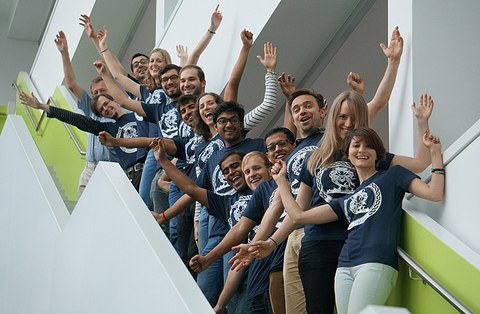Dec 01, 2014
TUD Team ‘Dresden DNAmic’ successful at the International BIOMOD Contest in Harvard

BIOMOD students
For the third time in a row, a students team of TU Dresden yesterday reached the second place at an international science contest in Harvard (USA): Under the supervision of cfaed research group leader Dr. Thorsten-Lars Schmidt, twelve students of the BIOTEC master's programs 'Molecular Bioengineering' und 'Nanobiophysics' took part in the annual ‘Harvard Biomolecular Design Competition’ (BIOMOD) in Boston. The interdisciplinary team ‘Dresden DNAmic’ uses the DNA-Origami-technique to create a nanometer-sized photonic circuit with the helices of the genetic code carrier and gold nanoparticles.
In the previous two years, the TUD teams ‘Dresden Nanormous’ (2013) and the ‘Dresden Nanosaurs’ (2012) also reached a second place each. The ‘Dresden DNAmics’ received the third prize in the category ‘Best video’, the first prize for the best website and therefore came on the second place over all. The winner was a team from Australia.
“The target of our project is the production of plasmonic waveguides,” the biochemist Leon Bichmann of the ‘Dresden DNAmic’ Team explains. “The laser light propagates from gold particle to gold particle along the path provided by the DNA origami. We want to construct photonic nanocircuits which can guide signals much faster than electric signals in a wire. The DNA will be used in a completely new context, not as a carrier for genetic information but as a building material.” Applications might include smart phones and computers as well as medical technologies.
The BIOMOD jury will judge not only the project itself, but also the project’s website, a live presentation and a video clip. Furthermore, the students had to find sponsors of industry and science for their project. “Also at the ‘Long Night of Science’ and at the senior academy in Dresden, we presented the concept of our DNA circuits”, team member Jana Sievers remembers. “Since January 2014, we worked on the project – a good exercise also for the master thesis”, the biotechnologist says.
The participation in this competition was initiated by TUD's 'B CUBE – Center for Molecular Bioengineering' and 'Biotechnology Center (BIOTEC)'. The international competition, in which 30 teams of the whole world participate, is organized by the Wyss Institute for Biologically Inspired Engineering at Harvard University. From 2010 to 2013, Dr. Thorsten-Lars Schmidt had spent his Post-Doc-period there, before he moved to Dresden as a research group leader of the Center for Advancing Electronics Dresden (cfaed), the Cluster of Excellence for Electronics of Technische Universität Dresden (TUD).
